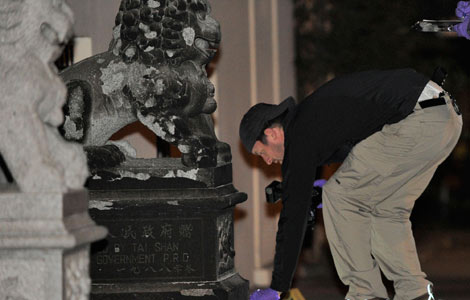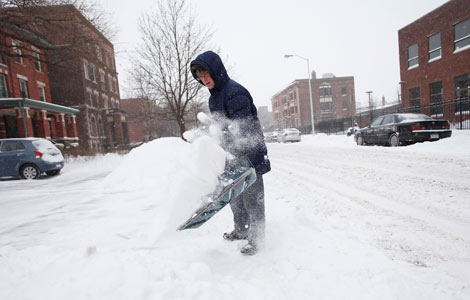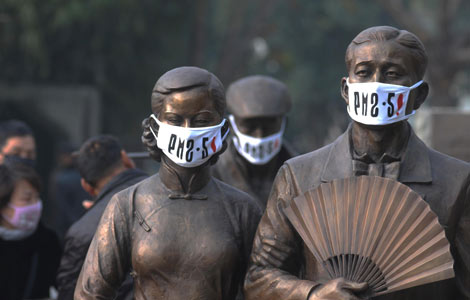UN officer calls for support for displaced
Updated: 2014-01-03 13:11
(Xinhua)
|
||||||||
UNITED NATIONS - The United Nations humanitarian chief on Thursday called for sustained support for millions who have been driven from their homes by violence and bloodshed or uprooted by devastating natural disasters.
"2013 was a real test of the global humanitarian system, and there is no indication that 2014 will be any different," UN Under-Secretary-General and Emergency Relief Coordinator Valerie Amos told a press conference here on recent humanitarian challenges.
According to her, the past year was marked by the international community's massive efforts to ease suffering in war-torn Syria and typhoon-hit Philippines, while 2014 has started amid sectarian fighting in both Central African Republic and South Sudan.
"It is clear that the United Nations and its partners will be needed more than ever," Amos said, noting that just a little more than two weeks ago, the world organization had launched its largest ever funding appeal, nearly $13 billion, to reach millions of people with life-saving aid in 2014, with half of that sought for those affected by the deepening crisis in Syria.
Tragically since then, she noted, inter-communal fighting has shattered the world's youngest nation, South Sudan, and bloody violence has spread throughout the Central African Republic, where a worrying crisis has been unfolding against a backdrop of abject poverty and a collapsing state.
"The world's collective response capacity and resources are being stretched to the limit," she said, stressing that more funds will be needed to address emerging needs.
In South Sudan, violence has driven an estimated 194,000 people from their homes in a matter of weeks with more than 57,000 seeking protection at UN missions.
Some 107,000 people have been reached with assistance. The UN Office for the Coordination of Humanitarian Affairs (OCHA) aims to reach over 600,000 people in the first three months this year.
"Aid organizations need access to affected communities to provide shelter, health care and clean water. People's lives depend on this," she said.
In Syria, where over 100,000 people have been killed since the conflict erupted in March 2011, the UN humanitarian chief noted that the collapse of the country's infrastructure, ongoing targeting of civilians and militarization of schools and hospitals remain ongoing concerns, with some 6.5 million people displaced and more than 2.3 million seeking refuge in neighboring countries.
"We continue to stress the need for a political solution to the crisis. Every day that passes leads to further deterioration of the situation," Amos said, adding that the funding need is " unprecedented".
On January 15, UN Secretary-General Ban Ki-moon is due to chair the second Pledging Conference for Syria, held in Kuwait City. Plans are also underway for the long-awaited Geneva II conference slated for January 22 in Switzerland.
On the Central African Republic, Amos said, violence and unrest continue against the backdrop of abject poverty and the collapse of the state, with more than 800,000 people internally displace, and a half-million going hungry.
"Aid agencies continue to scale up their response activities as fast as security conditions allow but it has not been easy," she said.
Similar problems are also taking place in Afghanistan, Haiti and Myanmar, Sudan, the Democratic Republic of the Congo, Somalia, Mali and eight other countries in the Sahel region.
The UN relief arm is following a twin track approach in the region, delivering food and other assistance to vulnerable people, while working to strengthen the ability of the people and the government to build resistance and absorb future shocks as a result of drought and other natural disasters.
The reforms the UN put in place two years ago are delivering real results, said Amos, but more work is needed to bridge its different elements, including political, development, peacekeeping and humanitarian arms, in a way which delivers strategic and sustained support.

 The Lego version of Downton Abbey
The Lego version of Downton Abbey
 Police probe fire attack on Chinese consulate
Police probe fire attack on Chinese consulate
 Powerful storm brings Arctic cold, snow to US
Powerful storm brings Arctic cold, snow to US
 Beijing sees little improvement in air quality
Beijing sees little improvement in air quality
 125th Rose Parade celebrated in US
125th Rose Parade celebrated in US
 Cold doesn't dissuade 'Polar Bear Swimmers'
Cold doesn't dissuade 'Polar Bear Swimmers'
 First photos of Liaoning battle group made public
First photos of Liaoning battle group made public
 US First Family out for shave ice in Hawaii
US First Family out for shave ice in Hawaii
Most Viewed
Editor's Picks

|

|

|

|

|

|
Today's Top News
As Obamacare begins, critics launch new assault
FBI: Consulate fire not terrorist act
Smog may affect mental health
New joint command system 'on way'
Chinese helicopter saves 52
US citizens express little hope in govt
China protests US' prisoner transfer
Snowstorm pushes into US Northeast
US Weekly

|

|







